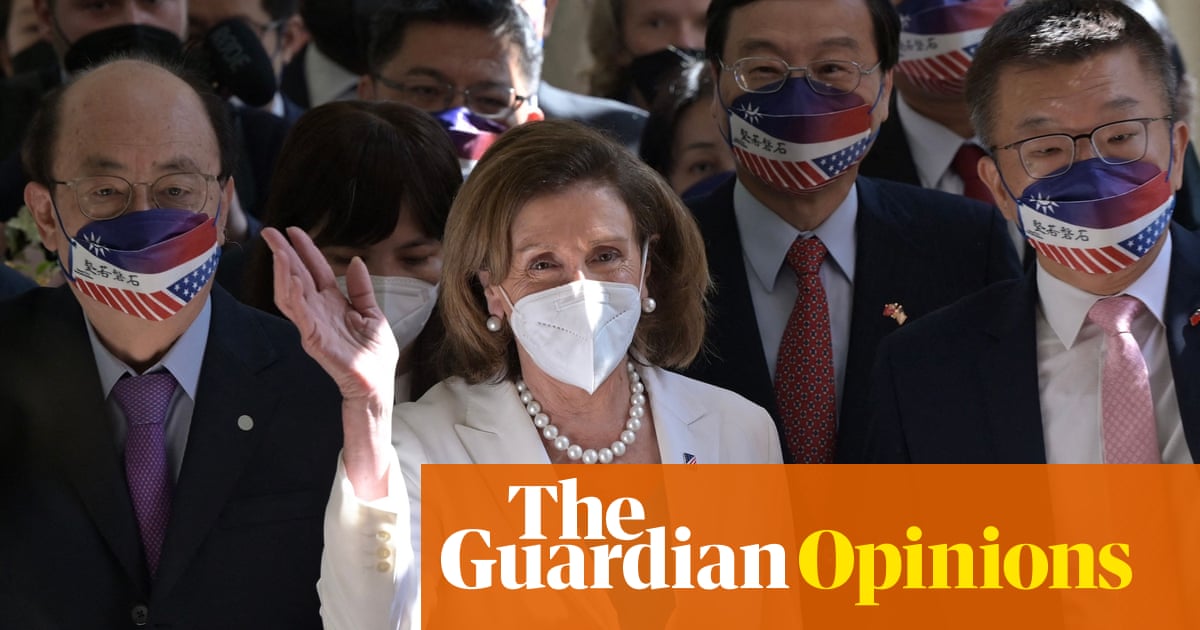China and the US are facing off – and in Taiwan we are caught between them
Show caption Nancy Pelosi arriving at the parliament in Taipei, Taiwan, 3 August 20222. Photograph: Sam Yeh/AFP/Getty Images Opinion China and the US are facing off – and in Taiwan we are caught between them Brian Hioe Nancy Pelosi’s visit to our island has put the world on edge. But for ordinary Taiwanese people, life has to carry on Wed 3 Aug 2022 11.11 BST Share on Facebook
Share on Twitter
Share via Email
It’s no secret why Nancy Pelosi’s visit to Taiwan has been such big news. As speaker of the US House of Representatives, she is in direct succession to the presidency after the vice-president. No comparable visit by a US official has taken place for 25 years. On the eve of the visit, there was talk of a possible fourth crisis in the Taiwan Strait; Xi Jinping warned the US that it was “play[ing] with fire”. Some commentators have been hyperbolic enough to invoke the prospect of world war.
But for people in Taiwan, for now at least, life carries on as usual. Such is the nature of living in a nation that has long been seen as a geopolitical pawn. What the Taiwanese actually want, or how we feel, is eclipsed by the “great power” showdown on our doorstep.
China has announced it will be conducting live-fire exercises around Taiwan in the coming days in response to Pelosi’s visit. But there is also nothing new about Chinese military threats directed at Taiwan. Beijing considers the island to be sovereign Chinese territory, even though it is de facto independent; the US is Taiwan’s security guarantor in the event of a Chinese invasion. Taiwan believes China has had thousands of missiles pointed at us for decades. Meanwhile, in the past few weeks, the domestic news cycle in Taiwan has seemed more focused on celebrity gossip and plagiarism claims involving a mayoral candidate than global affairs.
Tensions certainly are on the rise. Last October, China sent a record number of warplanes into Taiwan’s air defence identification zone. More recently, Chinese warships have been spotted off of outlying islands of Taiwan, such as Lanyu. But, still, these military threats often do not seem to register with the general public. Beijing has perhaps failed when it comes to establishing a narrative of escalating threats at Taiwan: for people here, the narrative is sometimes felt as one of endless repetition.
China claims Taiwan to have been part of its integral territory since time immemorial. The history is more complex. It was only incorporated into China during the Qing dynasty in the 17th century – but the Qing empire only controlled part of the island and did not seem particularly interested in it, ceding Taiwan to Japan after the Sino-Japanese war in 1895. After the Chinese civil war, which led to the triumph of the communists, control of Taiwan fell to the losing side, the Kuomintang (KMT), who brought a new wave of migrants but also subjected Taiwan to the period of authoritarianism known as the White Terror.
Flash forward several decades and Taiwan is now a flourishing democracy. The Democratic Progressive party, which emerged from Taiwan’s democracy movement, holds power. It currently advocates for maintaining the status quo, (which means the ambiguous position where Taiwan is de facto but not de jure independent). The KMT continues to be a political party, having reinvented itself as a political advocate of unification, though it has suffered a beating in recent elections and is trying to change its pro-China image. Most Taiwanese people seem to support the status quo too, with only tiny minorities wanting full independence or unification with China as soon as possible. The full picture is hard to ascertain since there are arguments that the Taiwanese would be more firmly pro-independence if there were no threats from China.
When news of Pelosi’s expected visit broke, I happened to be in Hualien, on the rural eastern seaboard, where the mountainous terrain that characterises central Taiwan meets the beach. As host to a number of military bases, Hualien is also where Taiwanese fighter jets would probably be deployed from, to conduct interceptions of Chinese planes in the event of a conflict or air intrusions.
I was there to observe the Qataban harvest festival of the indigenous Kebalan people. I had looked forward to learning more about how the Kebalan have kept their culture alive after centuries of colonialism from Han and other groups. Unverified disinformation circulated, meanwhile, on social media, such as the claim that all Taiwanese soldiers had their holidays called off and were being recalled to active duty. One of the community members I met was actually a soldier who had taken time off to participate in the festivities.
Some of the people I spoke to reflected on the effects tourism has on their ability to preserve their culture – Chinese tour groups having been a common sight in Taiwan before the pandemic. The issue points to part of Taiwan’s conundrum, in that it is deeply economically interlinked with China.
Immediately prior to the expected Pelosi visit, China announced import bans on 100 Taiwanese food products. Previous bans by China were aimed at pressuring farmers, fishers and other economically precarious groups into political compliance, for fear of being shut out of the Chinese market. China has also sought to use tourism for similar reasons.
Either way, I instead found myself on the fringes of the traditional ceremonies taking calls in the car park from international media. At one point, someone wandered over and asked what I was doing. They quipped that I should try to get the ceremony or the calmness of the beach in the shot – to show that, in Taiwan, life simply carries on.
Brian Hioe is one of the founding editors of New Bloom Magazine, an online magazine covering activism and youth politics in Taiwan and Asia Pacific













